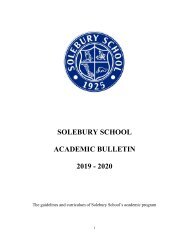You also want an ePaper? Increase the reach of your titles
YUMPU automatically turns print PDFs into web optimized ePapers that Google loves.
AP Calculus BC (Calculus I & Calculus II): This course is a full year calculus course that includes all
of the topics covered in AP Calculus AB plus topics typically covered in a Calculus II course at the
college level. Technology will be an important part of the class to reinforce work and to interpret results
of various experiments and data. This course is faster paced than the AB course and students should be
prepared to attend occasional class sessions outside of the regularly scheduled times. Students are
required to take the BC Advanced Placement exam in May. Prerequisite: B or better in Honors Pre-
Calc. AP, 6 credits. No Textbook Required
AP Statistics: The Advanced Placement course in Statistics is equivalent to a one-semester introductory,
non-calculus-based, college course in statistics. The AP Statistics course covers four broad themes which
include: exploring data, planning a study, anticipating patterns, and statistical inference. This course is
writing intensive. Students who have successfully completed Algebra II and who possess sufficient
mathematical maturity are eligible for this course. Students are required to take the Advanced Placement
exam in May. Prerequisite: B+ or better in Algebra II. AP, 6 credits
Textbook: The Practice of Statistics, 6 th ed. Starnes and Tabor, ISBN-13: 978-1319113339
ISBN-10: 1319113338
Multivariable Calculus: This yearlong course is similar to a third semester study of calculus at the
collegiate level and is a continuation of the topics typically studied in Calculus I and II. While calculus
up until this point has focused on the study of scalar-valued functions of one variable, multivariable
calculus considers multiple inputs and vector-valued outputs and thus students will learn to analyze
functions in a multidimensional setting. Familiar topics such as graphing, differentiation, and integration
will be extended as students learn about vector algebra and geometry in space, vector-valued functions,
functions of several variables, partial derivatives and chain rules, Lagrange multipliers, multiple
integration, iterated integrals, and change of variables. Students may exercise the option to take this
course for three college credits in “Advanced Calculus” through Delaware Valley
University. Registration and tuition payment of $300 to Del Val will occur during the fall term for
interested students. Prerequisite: AP Calculus BC or with approval of Math Department Chair). 6
credits. No Textbook Required
Financial Mathematics: This yearlong course will use a mixture of arithmetic and algebraic skills to
tackle the major concepts involved in the modern world of business and finance. The main topics to be
covered include simple & compound interest, consumer credit, and various investment tools, such as
annuities and Treasury Bills. Basic business applications will also be included in the course, such as
markup, markdown, and inventory methods. While some sophisticated mathematics will be used in this
course, (from algebra, pre-calculus, probability & statistics, calculus, and geometry) students need only to
have completed a second year course in algebra to be ready for the material here. Lastly, economic
concepts will be introduced and studied concurrently for the purpose of applying newfound mathematical
skills, as deemed appropriate by the instructor. These concepts include supply & demand, marginal cost,
stock market, and FOREX trading. Students should come out of this course with the knowledge of how to
use mathematics to make informed decisions as they earn, spend, and save money throughout the rest of
their lives. Prerequisite: Completion of Algebra II. 6 credits
No Textbook Required
Statistics: This two-trimester course is an introduction course in statistics intended for students who
want to understand statistics through a wide lens. It is not an AP course and does not follow the AP
curriculum. Topics discussed include: displaying and describing data, samples and sample size, the
normal curve, regression probability, statistical inference, confidence intervals and hypothesis testing with
applications in the real world. Students will be designing, testing and reporting on statistics.
Prerequisite: Algebra II or taking Algebra II concurrently. 4 credits.
No Textbook Required
20




